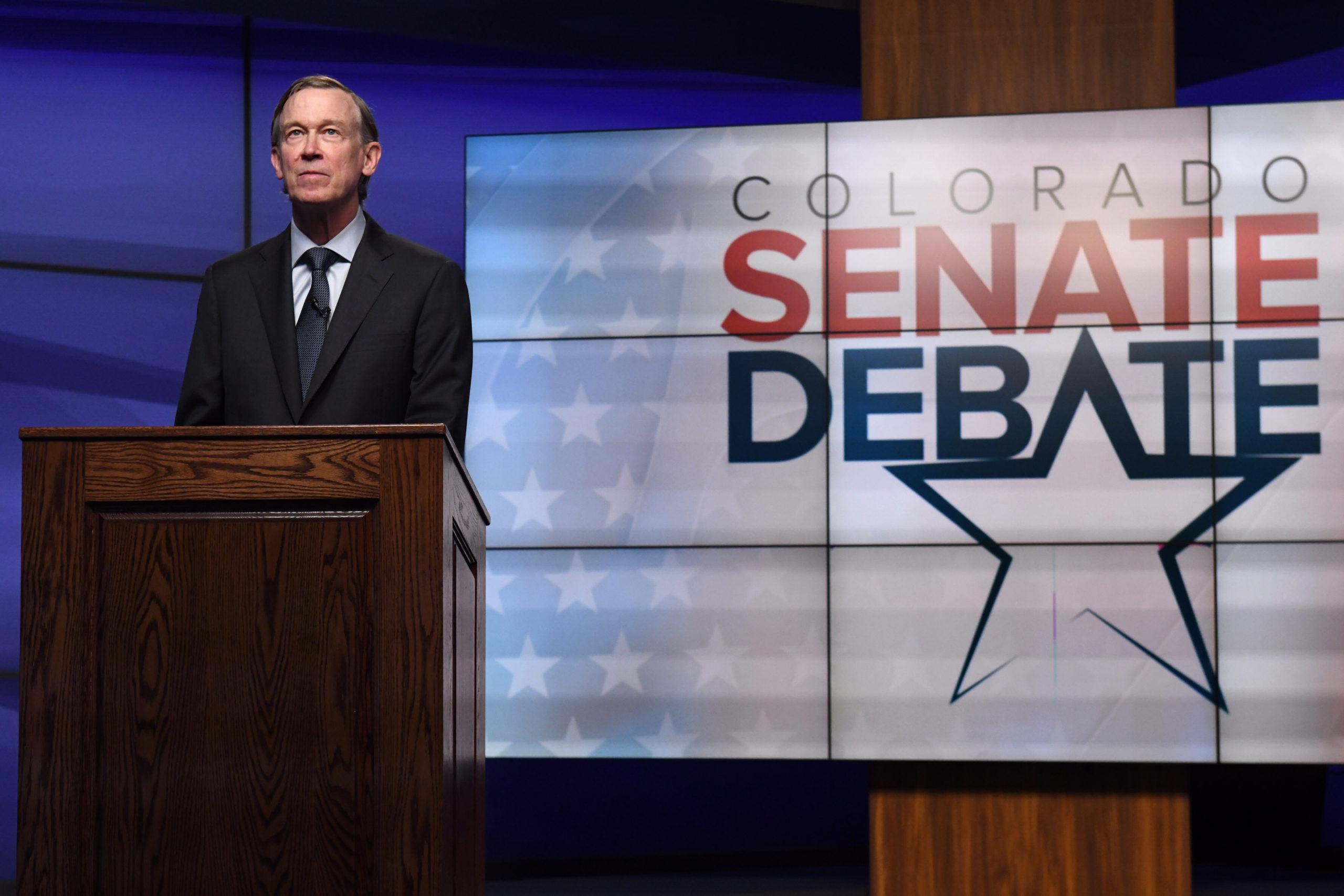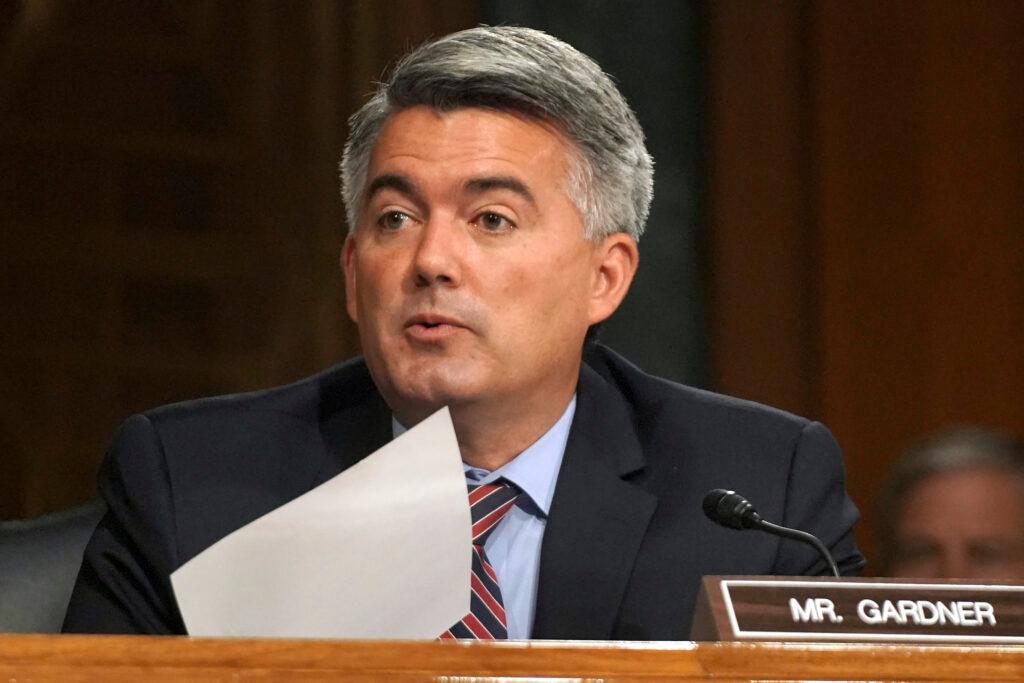
Update on Sept. 3, 2020 at 11:26 am: Sen. Cory Gardner and former Gov. John Hickenlooper have agreed to a debate sponsored by Colorado Public Radio, Denver 7 and The Denver Post. The two candidates for Colorado's U.S. Senate seat will meet at 5 p.m. on Oct. 9 for a 90-minute debate. CPR News will broadcast the debate across the state. Denver 7 will broadcast the first hour live and all three news organizations will stream it online.
In Colorado’s competitive Senate race, voters may not get many chances to see Republican Sen. Cory Gardner and his Democratic challenger John Hickenlooper go head-to-head.
The two candidates have not mutually agreed to any televised debates so far, potentially limiting voters’ chances to see more of them outside of 30-second television ads. Each campaign has released a list of debates and dates their team has accepted, but there’s almost no overlap. So far, the Pueblo Chieftain’s Oct. 2 debate is the only one on both of their calendars.
“I’m not sure if I would be shocked if they only agreed to one debate,” said political consultant Craig Hughes, who managed Democratic Sen. Michael Bennet’s campaign when he first ran for office in 2010.
“The debate over debates is a time-honored tradition and there’s always jockeying to see who gets the best position for the campaign and for voters.”
Hughes remembers that Bennet and Republican Rep. Ken Buck agreed to eight debates in their campaign.
This year, eight isn’t even in the cards.
“We are very hopeful of having a debate, and that’s what we’re working toward,” said Tim Ryan, the director of content for 9News, Colorado’s largest television station.
Ryan said 1998 was the last time 9News did not host a Senate debate, and that he’ll start to get worried after Labor Day if nothing is finalized.
“This seems to be unusually high stakes. There’s clearly high, high interest in this and that’s why you’re seeing additional scrutiny on the issue of debates and you see lots of media wanting to organize them,” he said. “It would be challenging to work that out between the campaigns without a referee.”
Colorado’s race is drawing a lot of attention because it is likely to be one of the most competitive in the country, and could help determine which party controls the Senate.
CNN hoped to hold a nationally televised debate. Gardner accepted. Hickenlooper did not, and his campaign said they were focusing attention on Colorado media. Many in-state news organizations, including CPR News, are joining forces to try to host a variety of debates.
The back and forth over the debates began even before Hickenlooper won the Democratic nomination, with Gardner’s office releasing a list in May of the debates that he would agree to participate in. What has followed since is an escalating back and forth of dates, locations, and hosts, with almost no agreement between the campaigns.
While debates don’t typically change the minds of voters who are already firmly in one camp or the other, they can provide insights into the candidates, both on their stances on issues and how they handle tough questions. A strong debate performance can inject much-needed enthusiasm into a campaign, and the opposite is also true. A misstep or weak performance can come back to haunt a candidate.
Beth Frederick is the type of voter the campaigns need to reach. She’s a registered Democrat from Highlands Ranch who backed both men in 2014: Gardner for Senate, and Hickenlooper for governor. Now that they’re competing against each other, she hasn’t decided what to do.
“There's things I really support for Cory Gardner and there's things that I really support for Hickenlooper,” Frederick said. “My ideal candidate would have somebody that would have both... of their strengths. I am undecided at this point.”

In a normal campaign year, candidates would be hosting large public events to rally their supporters. But the coronavirus pandemic has made that impossible, making a robust series of debates potentially more important, according to Tim Wieland, news director for CBS4.
“You get to see the candidates for one hour with no slick production value and hold their feet to the fire on their policy differences and it maybe gives you a little insight on a candidate’s temperament and values,” he said.
CBS4 hosted one of the three televised debates between Hickenlooper and Andrew Romanoff during the Democratic primary race. Candidate face-offs were also an issue in that contest; Hickenlooper was criticized by his opponents for skipping numerous candidate forums earlier in the race.
Wieland said Hickenlooper’s campaign has not agreed to his station’s invitation to debate with Gardner this fall, but he hasn’t entirely given up hope.
“We’ve always had a good relationship with John Hickenlooper,” he said. “Every time we’ve invited John Hickenlooper to debate on this TV station he’s accepted.”
When it comes to the question of who’s to blame for the lack of agreed-upon debates, the two campaigns have been publicly pointing fingers at each other.
Gardner "has so far refused to join us for statewide and Spanish-language debates. We're calling on him to accept these invitations,” tweeted Melissa Miller Hickenlooper’s communications director.
Miller went on to list a range of outlets on which she said Hickenlooper was willing to face Gardner.
Gardner’s campaign fired back that claim is untrue.
“Our campaign has been in contact with every single debate host & have offered many dates to debate. Hick claimed to the press he was negotiating w/ our campaign. When we contacted their team, they told us they would only negotiate through debate hosts,” tweeted Jerrod Dobkin, Gardner's communications director.
Debate organizers have also gotten involved; Club 20, the influential organization of Western Slope Counties, held a press conference to criticize Hickenlooper’s decision to skip its annual September forum. The Democratic candidate in Colorado’s congressional district that represents the Western Slope, Diane Mitsch Bush, is also not participating. When he was running for governor, Jared Polis declined a Club 20 invitation and some Democrats say the event has become more Republican-friendly and partisan over the years.
Where the candidates debate isn’t the only point of contention; the campaigns also wrangle over when. Gardner’s campaign argues debates should come before ballots are mailed out in October. Hickenlooper’s campaign said they should happen closer to the election when most voters are really paying attention.
Unless the candidates budge from their preferred venues and dates, there’s a chance their ability to showcase their disagreements to the public may fall prey to their inability to agree behind the scenes.








